Abstract
OBJECTIVE: To validate an adaptation of a short questionnaire measuring behaviour related to selecting low fat diets. The questionnaire was adapted for telephone use in a low income, low education population. DESIGN: The factorial structure of the 38 item adaptation was studied in a population based random sample of 1432 adults. Seven day test-retest reliability was measured in a convenience sample of 93 adults, and criterion related validity in measuring fat was assessed against a dietitian administered diet history in another convenience sample of 81 adults. SETTING: Adults aged 18-65 years living in low income, inner city neighbourhoods in Montreal, Canada. RESULTS: Principal components analysis identified five food factors: avoid fat, junk food, high fat traditional foods, low fat substitutes for high fat foods, and modification of meat to reduce fat. Two factors were similar to those of the original version. Internal consistency of the subscales ranged from 0.49-0.72. Test-retest reliability ranged from 0.72-0.90. Validation of the subscales against usual dietary intake indicated that the "junk food" factor, arising from questions added to the original questionnaire to reflect local dietary habits, was most closely related to fat intake (r = 0.48; p < 0.001). CONCLUSION: This telephone adaptation provides an inexpensive and valid method of measuring fat intake. However, these results suggest that adaptations of existing dietary instruments should be validated in the populations for which they are intended before they are used.
Full text
PDF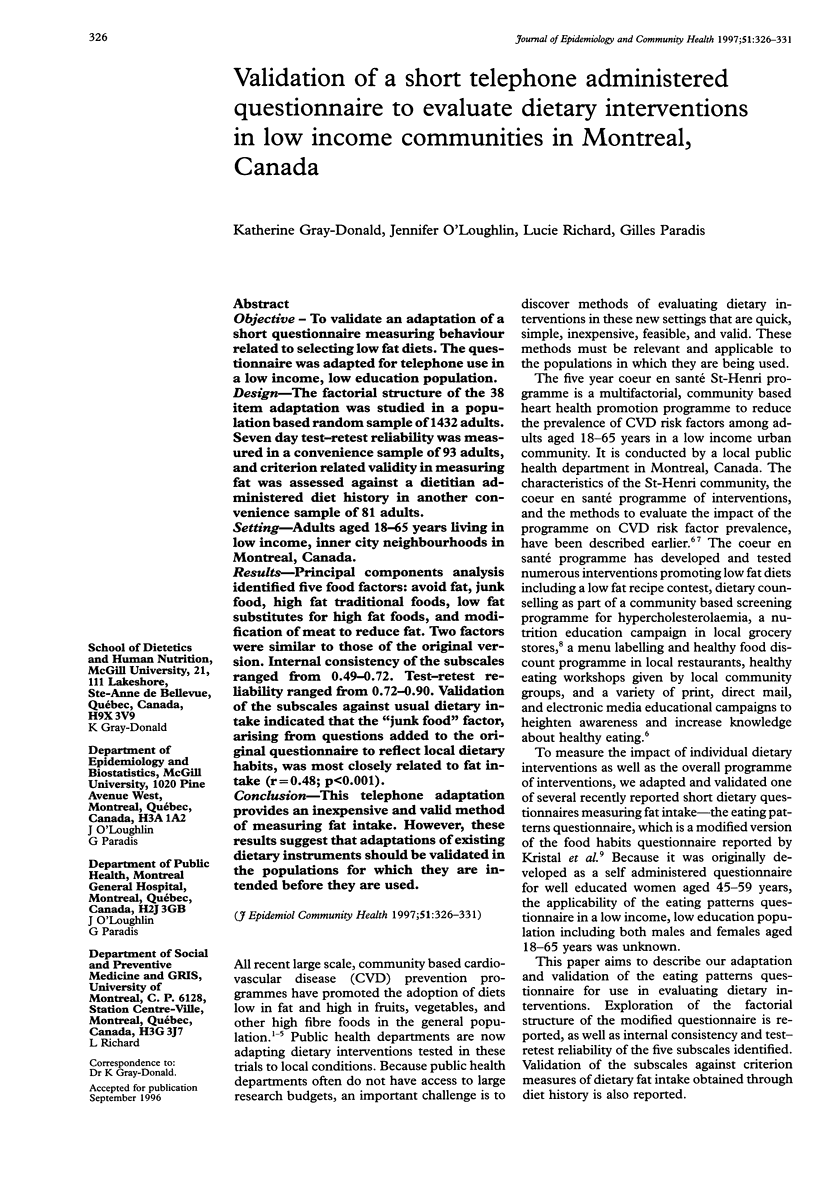
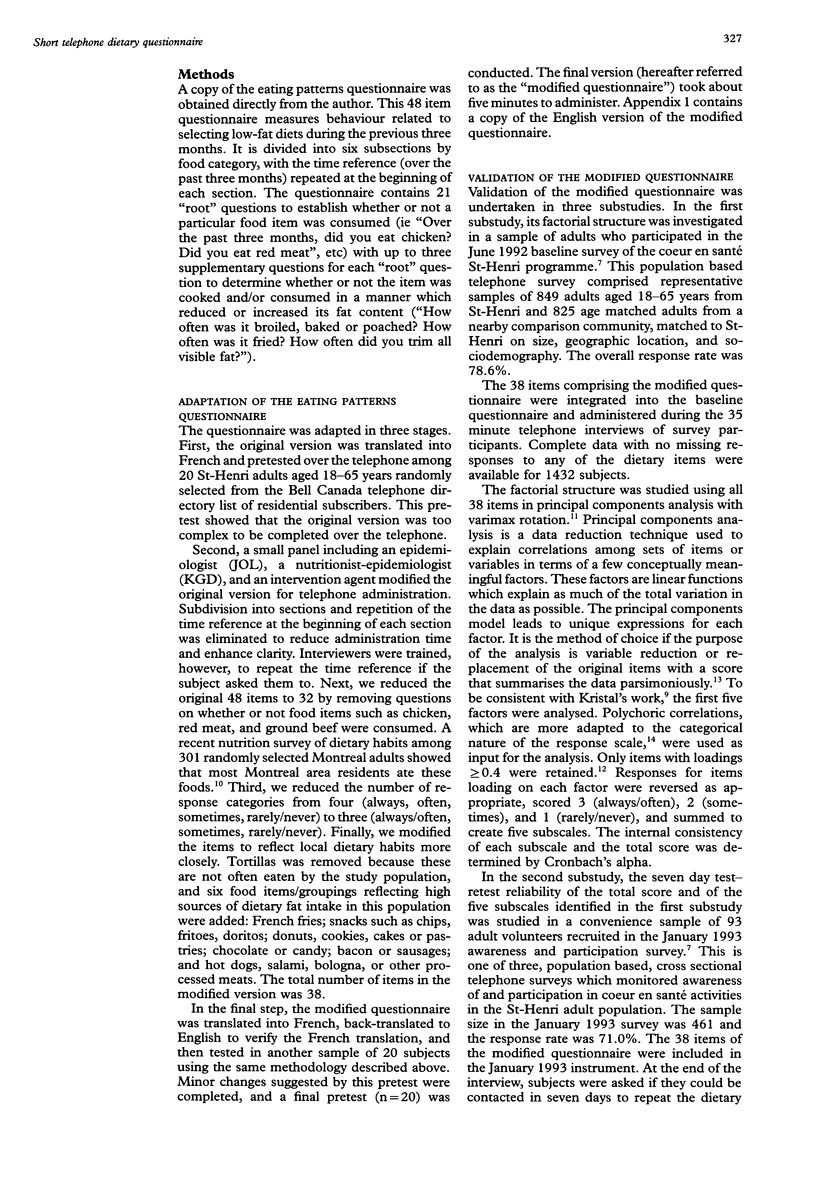
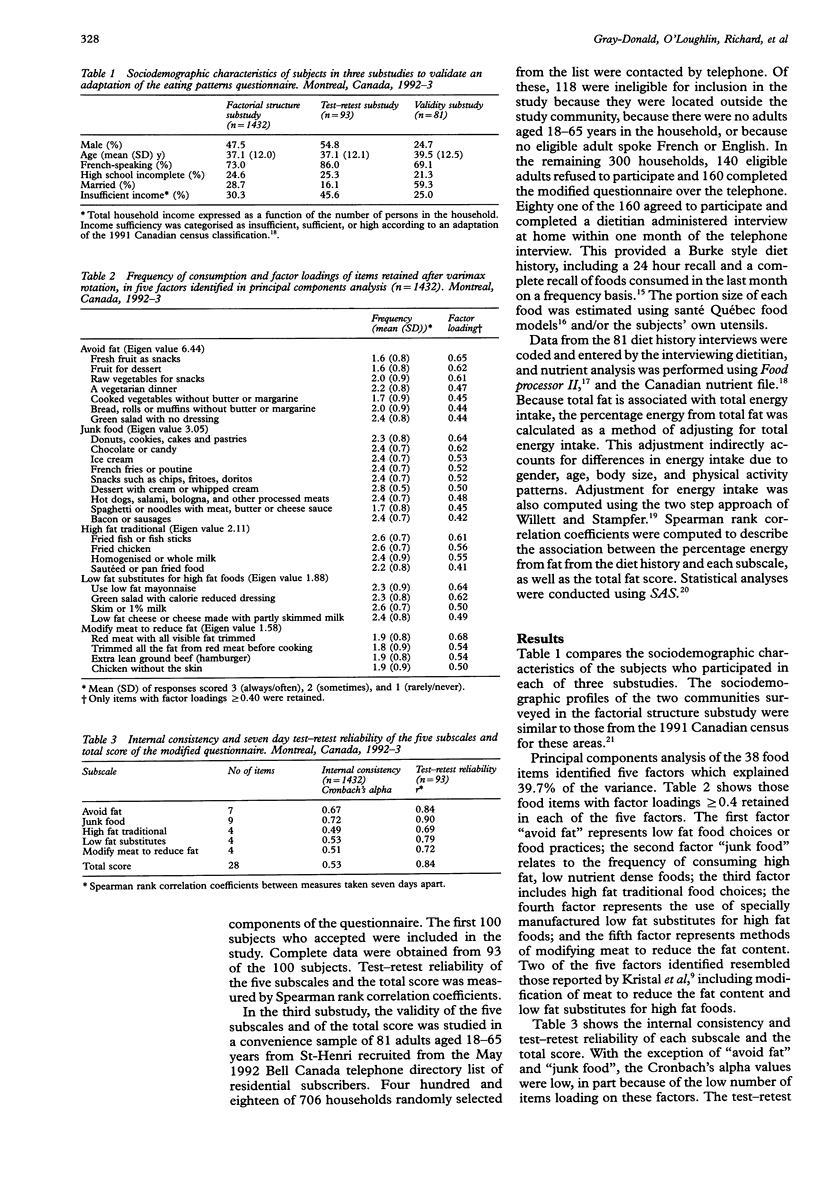
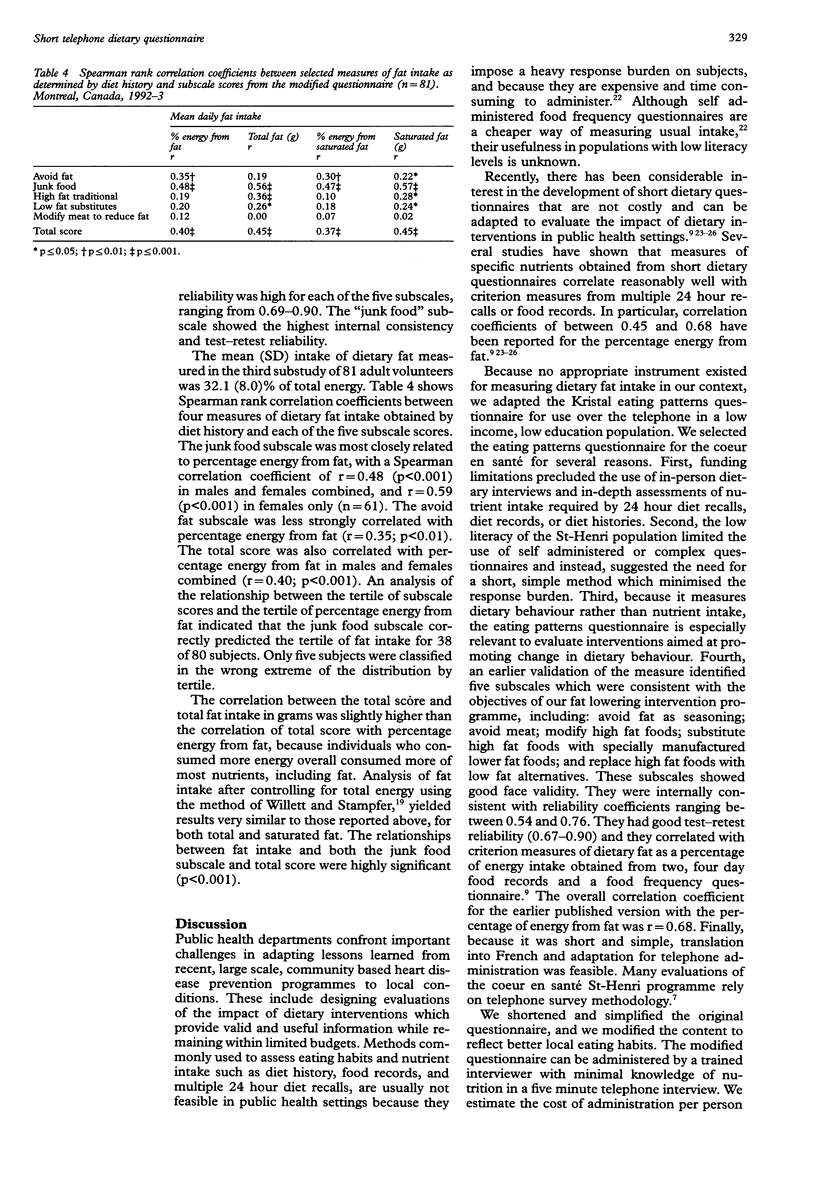
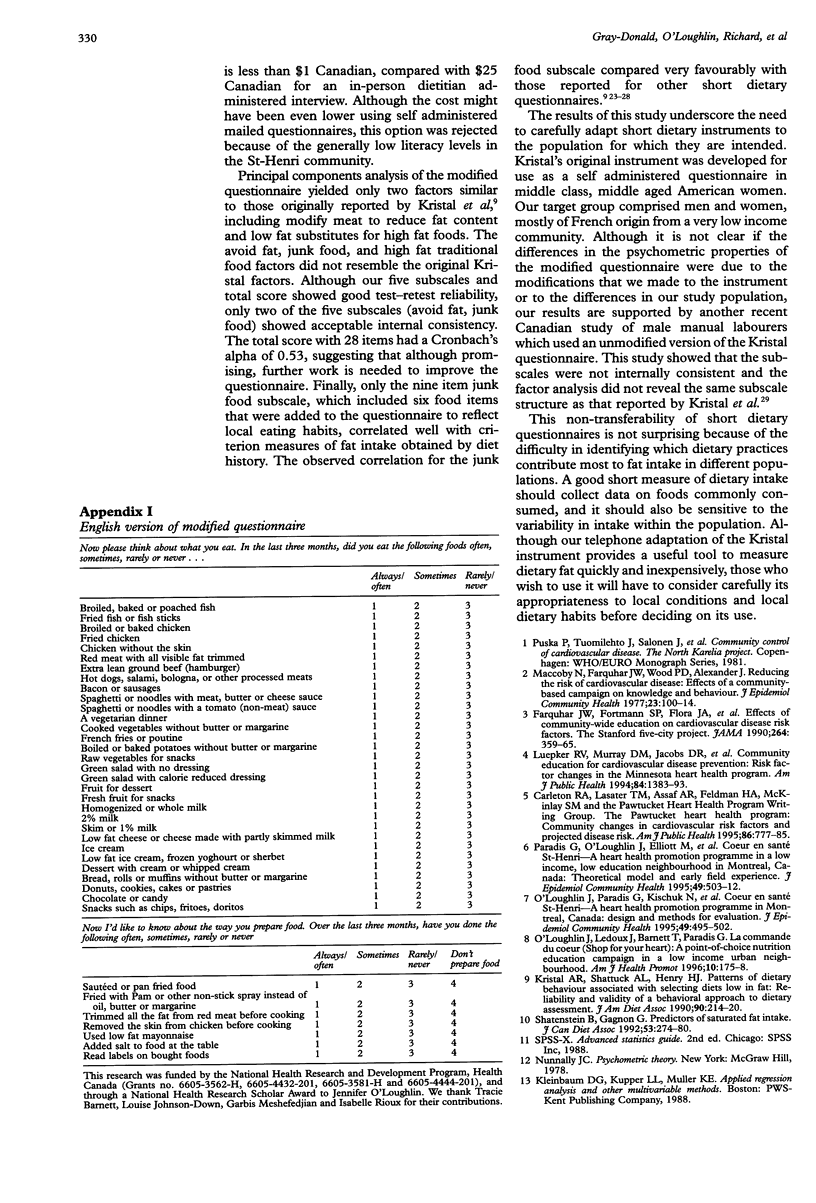

Selected References
These references are in PubMed. This may not be the complete list of references from this article.
- Birkett N. J., Boulet J. Validation of a food habits questionnaire: poor performance in male manual laborers. J Am Diet Assoc. 1995 May;95(5):558–563. doi: 10.1016/S0002-8223(95)00152-2. [DOI] [PubMed] [Google Scholar]
- Block G., Hartman A. M., Naughton D. A reduced dietary questionnaire: development and validation. Epidemiology. 1990 Jan;1(1):58–64. doi: 10.1097/00001648-199001000-00013. [DOI] [PubMed] [Google Scholar]
- Carleton R. A., Lasater T. M., Assaf A. R., Feldman H. A., McKinlay S. The Pawtucket Heart Health Program: community changes in cardiovascular risk factors and projected disease risk. Am J Public Health. 1995 Jun;85(6):777–785. doi: 10.2105/ajph.85.6.777. [DOI] [PMC free article] [PubMed] [Google Scholar]
- Curtis A. E., Musgrave K. O., Klimis-Tavantzis D. A food frequency questionnaire that rapidly and accurately assesses intake of fat, saturated fat, cholesterol, and energy. J Am Diet Assoc. 1992 Dec;92(12):1517–1519. [PubMed] [Google Scholar]
- Farquhar J. W., Fortmann S. P., Flora J. A., Taylor C. B., Haskell W. L., Williams P. T., Maccoby N., Wood P. D. Effects of communitywide education on cardiovascular disease risk factors. The Stanford Five-City Project. JAMA. 1990 Jul 18;264(3):359–365. [PubMed] [Google Scholar]
- Kinlay S., Heller R. F., Halliday J. A. A simple score and questionnaire to measure group changes in dietary fat intake. Prev Med. 1991 May;20(3):378–388. doi: 10.1016/0091-7435(91)90036-4. [DOI] [PubMed] [Google Scholar]
- Kristal A. R., Shattuck A. L., Henry H. J. Patterns of dietary behavior associated with selecting diets low in fat: reliability and validity of a behavioral approach to dietary assessment. J Am Diet Assoc. 1990 Feb;90(2):214–220. [PubMed] [Google Scholar]
- Luepker R. V., Murray D. M., Jacobs D. R., Jr, Mittelmark M. B., Bracht N., Carlaw R., Crow R., Elmer P., Finnegan J., Folsom A. R. Community education for cardiovascular disease prevention: risk factor changes in the Minnesota Heart Health Program. Am J Public Health. 1994 Sep;84(9):1383–1393. doi: 10.2105/ajph.84.9.1383. [DOI] [PMC free article] [PubMed] [Google Scholar]
- Maccoby N., Farquhar J. W., Wood P. D., Alexander J. Reducing the risk of cardiovascular disease: effects of a community-based campaign on knowledge and behavior. J Community Health. 1977 Winter;3(2):100–114. doi: 10.1007/BF01674232. [DOI] [PubMed] [Google Scholar]
- O'Loughlin J., Ledoux J., Barnett T., Paradis G. La Commande du Coeur ("Shop for Your Heart"): a point-of-choice nutrition education campaign in a low-income urban neighborhood. Am J Health Promot. 1996 Jan-Feb;10(3):175–178. doi: 10.4278/0890-1171-10.3.175. [DOI] [PubMed] [Google Scholar]
- O'Loughlin J., Paradis G., Kishchuk N., Gray-Donald K., Renaud L., Finès P., Barnett T. Coeur en santé St-Henri--a heart health promotion programme in Montreal, Canada: design and methods for evaluation. J Epidemiol Community Health. 1995 Oct;49(5):495–502. doi: 10.1136/jech.49.5.495. [DOI] [PMC free article] [PubMed] [Google Scholar]
- Paradis G., O'Loughlin J., Elliott M., Masson P., Renaud L., Sacks-Silver G., Lampron G. Coeur en santé St-Henri--a heart health promotion programme in a low income, low education neighbourhood in Montreal, Canada: theoretical model and early field experience. J Epidemiol Community Health. 1995 Oct;49(5):503–512. doi: 10.1136/jech.49.5.503. [DOI] [PMC free article] [PubMed] [Google Scholar]
- Peters J. R., Quiter E. S., Brekke M. L., Admire J., Brekke M. J., Mullis R. M., Hunninghake D. B. The Eating Pattern Assessment Tool: a simple instrument for assessing dietary fat and cholesterol intake. J Am Diet Assoc. 1994 Sep;94(9):1008–1013. doi: 10.1016/0002-8223(94)92194-6. [DOI] [PubMed] [Google Scholar]
- Verdier P., Beare-Rogers J. L. The Canadian Nutrient File. J Can Diet Assoc. 1984 Jan;45(1):52–55. [PubMed] [Google Scholar]
- Willett W., Stampfer M. J. Total energy intake: implications for epidemiologic analyses. Am J Epidemiol. 1986 Jul;124(1):17–27. doi: 10.1093/oxfordjournals.aje.a114366. [DOI] [PubMed] [Google Scholar]


